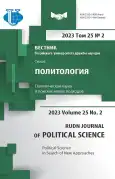Новые дилеммы теории «справедливой войны»
- Авторы: Шанченко Е.П.1,2,3
-
Учреждения:
- Национальный исследовательский институт мировой экономики и международных отношений имени Е.М. Примакова Российской академии наук
- Московский государственный институт международных отношений (университет) Министерства иностранных дел Российской Федерации
- Сеченовский Университет
- Выпуск: Том 25, № 2 (2023): Политическая наука в поисках новых подходов
- Страницы: 319-329
- Раздел: В ПОИСКАХ ТЕОРЕТИЧЕСКИХ РАМОК ПОЛИТИЧЕСКОГО
- URL: https://journal-vniispk.ru/2313-1438/article/view/322228
- DOI: https://doi.org/10.22363/2313-1438-2023-25-2-319-329
- EDN: https://elibrary.ru/ZCYKIU
- ID: 322228
Цитировать
Полный текст
Аннотация
Обращаясь к классическим постулатам теории справедливой войны, автор рассматривает также ее современные прочтения. В ходе исследования автор приходит к выводу о том, что некоторые политологи модернизировали эту теорию. Так, вследствие появления новых акторов на международной арене, в теории справедливой войны появился неклассический вариант, позволяющий включать негосударственных акторов в сферу анализа (что привело к отмене отдельных принципов теории: принципа легитимности власти, принципа крайнего средства, а также к возможности имплементации превентивных действий), а также возникли принципы jus post bellum. Интересно, что, с точки зрения отдельных исследователей, вопрос теории справедливой войны неразрывно связан с вопросом глобального лидерства США. В ходе истории изменились участники и мотивы ведения войн, изменяются и критерии их «справедливости» (например, теория пунитивной войны). Детально анализируя постулаты теории «справедливой войны», автор обращается к историческим событиям: «арабской весне», противостоянию США и СССР, современным информационным войнам. Автор приходит к выводу, что использование теории «справедливой войны» для анализа событий современности остается по-прежнему актуальным, однако требует внесения новых постулатов в нормативы теории, в частности дополнения принципов jus ad bellum и jus post bellum.
Ключевые слова
Об авторах
Екатерина Павловна Шанченко
Национальный исследовательский институт мировой экономики и международных отношений имени Е.М. Примакова Российской академии наук; Московский государственный институт международных отношений (университет) Министерства иностранных дел Российской Федерации; Сеченовский Университет
Автор, ответственный за переписку.
Email: shanchenkoep@gmail.com
ORCID iD: 0009-0004-1522-3589
младший научный сотрудник Центра евроатлантической безопасности Института международных исследований, Московский государственный институт международных отношений (университет) Министерства иностранных дел Российской Федерации; старший преподаватель, Институт лингвистики и межкультурной коммуникации, Сеченовский Университет; соискатель, Национальный исследовательский институт мировой экономики и международных отношений имени Е.М. Примакова Российской академии наук
Москва, Российская ФедерацияСписок литературы
- Amini, A.R. (2021). The reasons for the failure of the US + NATO mission in Afghanistan and the forecast of the situation in the country under the “new regime”. PolitBook, (3), 99–109 (In Russian) http://doi.org/10.17976/jpps/2020.05.09
- Bugrov, K.D., & Loginov, A.V. (2020). Back to the subject: Theories of just war in contemporary political thought. Polis. Political Studies, (5), 114–129. (In Russian)
- Demidov, K.B. (2023). The Arab East: The end of neoliberalism. What’s next? Information and analytical journal of INION RAS Social and Humanitarian Sciences. Domestic and foreign
- literature. Ser. 9. Oriental studies and African studies, (1), 38–62. (In Russian) Fotion, N. (2016). Two theories of a just war. Ethical Thought, 16(2), 169–186.
- Kaldor, M. (1999). New and old wars: Organized violence in a global era. Stanford, California: Stanford University Press, 1999.
- Kashnikov, B.N. (2019). The theory of a just war: A critique of the basic principles. Ethical Thought, 19(2), 152–167. (In Russian)
- Kashnikov, B.N. (2020). Global sovereignty and moral degradation of war. Voprosy Filosofii, (2), 14–25. (In Russian)
- Kumankov, A. (2019). Philosophy of war. A brief history. Logos, 29(3), 99–116. (In Russian)
- MacMahan, J. (2006). The ethics of killing in war. Philosophia, 34(1), 23–41. http://doi.org/10.1007/ s11406-006-9007-y
- McMahan, J. (2019). Rethinking “a Just War”. Logos, 29(3), 139–156. (In Russian)
- Sidorenko, I.N. (2020). The phenomenon of “just war” and its transformation in the modern world. Proceedings of BSTU. Series 6: History, philosophy, (1), 116–120. (In Russian)
- Sidorov, A.Yu., & Fradkova, V.I. (2023). The doctrine of “regime change” in the American foreign policy tradition and ideology. Obozrevatel — Observer, (1), 17–29. (In Russian)
- Walzer, M. (1977). Just and unjust wars. A moral argument with historical illustrations. New York, 1977.
- Walzer, M. (2019). The triumph of the theory of just war (and the danger of success). Logos, 3, 117–138. (In Russian)
Дополнительные файлы









